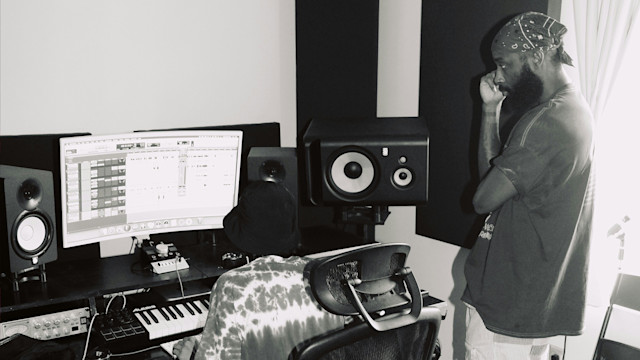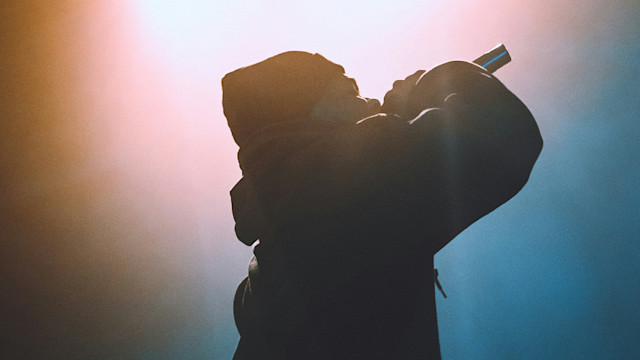Utilizing the Perfect Rap & ‘Type’ Beats for Rappers
October 15, 2024 - Looking for something to accompany your bars or inspire you? Finding the perfect rap or ‘Type’ beat to hone your flow can be a challenge. Here’s how you can get started quickly!

You’ve got the words on the page, the ideas for flow, but you need to see how they’re going to work when accompanied by the right beat.
You could pay a producer to make you some beats, but this can be expensive. You could also dive into producing yourself, but this is time consuming if you are still learning and just want to practice your bars. Quite often, rappers looking to hone their skills without the help of a readily available producer will use Rap Beats and ‘Type’ Beats which allow them to test their ideas alongside music. This guide will help you understand how to use these types of beats, where you can find them, and how to work with them to create your own sound. Let’s dive in!
What are Rap & ‘Type’ Beats?
Rap & ‘Type’ beats can be the same thing, but identifying the difference between the two is important, in order to save you time when you’re looking for the right beat. The two terms are often used interchangeably, so be aware of this when on the hunt for a beat.
Rap Beats
As a rule, rap beats are typically fairly generic instrumental tracks with no particular individual in mind when they were created. They are not generic in a bad sense, but the term is more broad. For example, if you searched for ‘rap beats for rappers’ you’re likely to find a multitude of different beats, ranging from drill to 90s Boom Bap. You would have to find the right beat for your style, but you would end up with more variety of beats to choose from.
Type Beats
‘Type’ beats are more specific, and they’re often created by producers to show off their chops, imitate a particular producer or artist, or just mimic a specific genre. Typically though, you’ll search the words ‘type beat’ with the artist’s name before it. For example, if you search for ‘KAYTRANADA type beat,’ you’ll get search results for catchy, boom-bap tracks that have similar production qualities to KAYTRANADA. This is a great way to find specific beats if you know what artists influence you, and you want to get inspiration- either for yourself or for the producer you’re working with.
Using Beats
One of the most important things you have to consider when using type beats, either for practice or for inspiration, is to not infringe on copyright. Mostly, rap beats for rappers you’d find online have their own copyrights attached to them, even if they are mimicking a certain producer or style. You can’t use type beats or rap beats for your own music without explicit permission from the producer, or if you’ve purchased the beat to use for commercial purposes.
Quite often, when I’m making a beat for a rapper or artist, I’ll receive their vocal tracks over the top of a type beat, with some instructions on what kind of sound they’re going for. It’s then my job as a producer to replicate the style they want, without infringing on any copyright, and giving the artist their own unique style. Ultimately, you can use generic rap beats for rappers, or use type beats to practice, and to help your producer. However you cannot download them, rap over them, and then release them on streaming services. That would be a violation of copyright and get you in serious trouble, either resulting in your music being removed from streaming services, or some financial consequences.
Where can you find them?
Finding rap beats for and type beats for rappers is often overwhelming- there are a million different places to start, and identifying the pros and cons of each source is important. Here’s a quick overview of where you are likely to find rap beats, and their benefits and drawbacks.
Producers
Pros
Unique beats
No copyright infringement if obtained directly from the producer.
Cons
Can get very expensive
Not necessary for honing your bars or practicing
Beat marketplaces
Pros
Wide selection to choose from.
No copyright infringement if obtained directly from the producer on a beat marketplace.
Cons
Multiple people can download them, so they won’t be unique.
Can be unaffordable.
YouTube
Pros
Easily available
Cons
Copyright issues could arise.
Often used by most people, even more than beat marketplaces.
DAWs (Digital Audio Workstations)
Pros
Option make your own
Often royalty free loops and beats come with the DAWs
You can edit out parts you don’t like
Teaches you about production and gets you in the producer mindset
Cons
Can be tricky to navigate
Depending on the software, buying a DAW outright can be very expensive.
DAWs (Digital Audio Workstations) are basically programs that make music, and they’re really powerful and flexible. DAWs and Software like Soundtrap are often overlooked sources of type beats and rap beats for rappers. Typically, people will search YouTube type beats, and most of my clients send me YouTube links with their rapping over the top. This can get really awkward and challenging if two clients use the same type beat, and it doesn’t make you stand out from the crowd.
If you get into the habit of using DAWs, you’ll very quickly begin to understand how producing rap beats with rappers in mind works. Rather than just adjusting your flow to fit a certain beat you found online, you’ll be able to adjust the beat to emphasize certain parts of your flow. You’ll also begin to understand certain producer terms which will help you explain what you want when working with a producer.
Some DAWs are very expensive, but Soundtrap is completely free, works online, and has collaboration features, which means you can make changes in real time as you work alongside a producer. This level of control is unprecedented- in the past rappers were at the mercy of their producer, and countless hours have been wasted with miscommunication, misunderstandings, and lack of transparency. You also won’t have to worry about your laptop struggling to deal with a fully downloaded DAW- everything with Soundtrap is online and ready to go!
Soundtrap also has sound packs, and fully created demo projects which you can rap over if you need to practice. It’s simply a case of opening a demo project, and dragging and dropping things from the sound pack into the editor if you’d like to change things. You can find more information about how to use Soundtrap here.

Making Your Own Beats
Making your own beats can be really daunting, but it can also be incredibly fun, quick, and easy with the right software. Here, I’ll quickly outline a few examples of how you can make rap beats for other rappers or yourself. All using Soundtrap, and all for free. Oh and by the way, you don’t need any knowledge of music theory or how to play an instrument. You just need to know what sounds good!
Drums and Beats
The first thing you need to do is to get a solid beat down. Rap and Hip-Hop is driven by the power of the beat, and how it makes speakers shake. You’ll hear the term 808s, or 808 a lot in rap production. This is the most commonly used drum machine in the world, and is perfect for making rap beats. However, Soundtrap has a virtual drummer which creates the drum beat for you. Just click ‘Enter Studio,’ and add the ‘Smart Drummer’ track. I’d recommend using 120bpm for your first beat, as this is a really commonly used tempo across many genres. Alternatively, you can click on the loop library, and drag and drop whichever beat you like!
Bass
Want to get a big booming bass sound? Then you need to use 808 basses. Head into the beat library, click on ‘Bass’ then ‘Hip-Hop’ and look for a loop which has the word ‘808’ in it. Simply drag and drop that loop into the editor window, and Soundtrap will take care of the rest.
Melody
Now for the fun bit. A catchy melody can seriously elevate a rap beat and give it depth and character. Head on over to the loop library again, click on Synths, then the genre you want, and find the right melody for you. All of the loops will line up in terms of tempo and key, and you’ll be able to just let your ears do most of the work. Once you’ve got these three simple parts of the beat, just copy and paste them over and over for however long you want. Congratulations, you’ve just made your first rap beat, without having to break the bank, learn music theory, or compromise on your vision.
Conclusion
Using specially designed rap beats for rappers can be a great way to hone your skills in your bedroom, or to just get inspired. However, you must be aware that copyright laws will dictate how far you can take these rap beats. I’d strongly recommend getting to grips with the basics of using a DAW, so you have the ability to sit in the producer’s chair and get your beats and bars working in harmony.
About the author
Max McLellan is a composer, songwriter, and audio engineer with credits ranging across film, TV and radio. He provides composition, mixing, and mastering services through his company MKM Audio.
Get started with Soundtrap today!